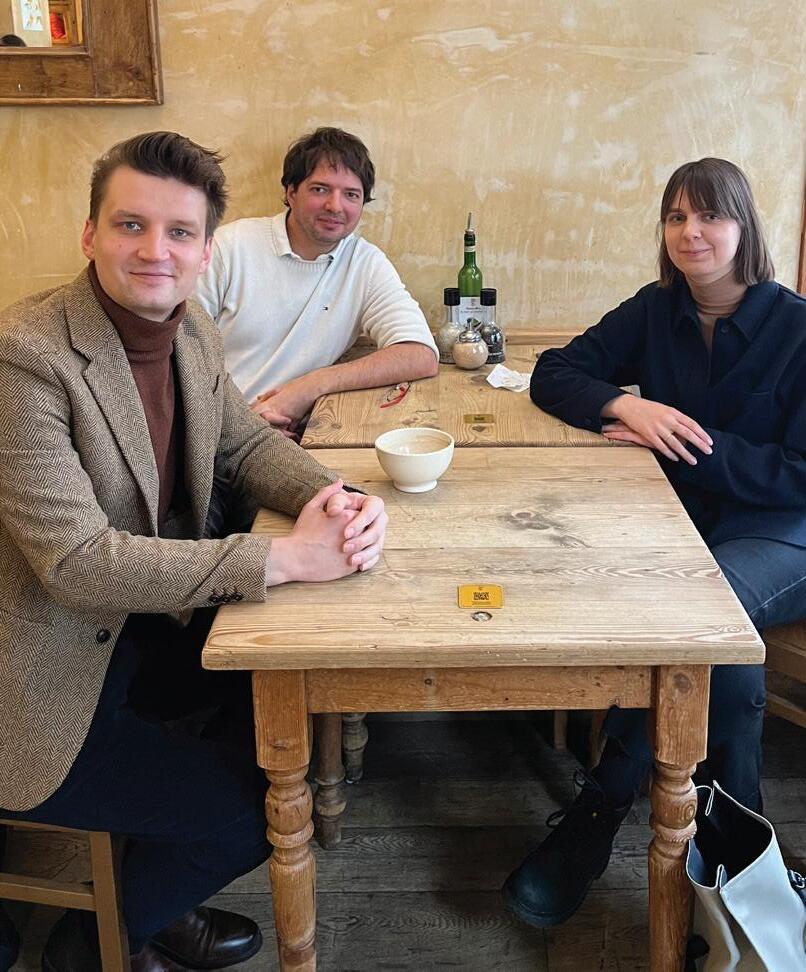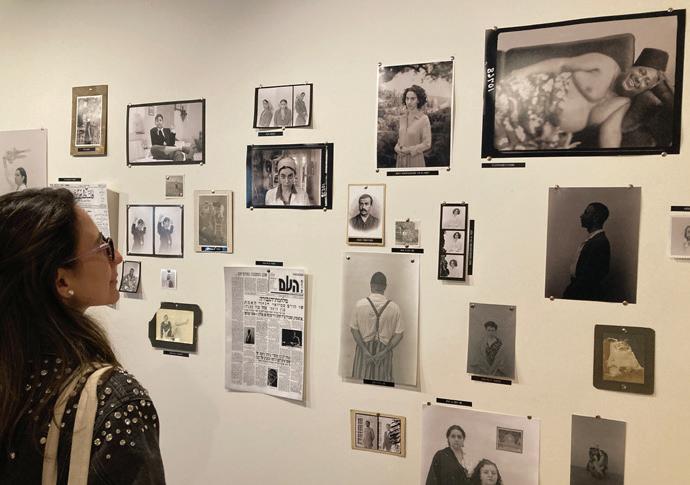
5 minute read
A GROWING RESEARCH AGENDA
Democracy Institute
The Democracy Institute (DI) continues to serve as an active incubator of innovative research and public engagement on open society, democracy and academic freedom. The DI’s new flagship project, the OSUN Forum on Democracy and Development, is a three-year research project that brings together partners in Bogotá, Johannesburg, and Budapest to collaborate on a multi-disciplinary study of social exclusion, patterns of mobilization, populism, and state development linked with the decline and revival of democracies. These research efforts will be translated into innovative teaching and disseminated across the network via the DI’s widely read Review of Democracy, now featuring regional editors highlighting intellectual contributions by scholars from the Global South. Building on links with the OSUN Threatened Scholars Integration Initiative, and other academic freedom initiatives, the DI also launched Academics Facing Autocracy - a fellowship that rethinks the relationship between academic freedom and democracy.
Advertisement
Global Observatory On Academic Freedom
Through rigorous academic research that addresses the urgent need for rethinking the concept of academic freedom, the Global Observatory on Academic Freedom (GOAF) has focused on new challenges to the definitions and safeguards of academic freedom amid the resurgence of authoritarianism and illiberal threats to critical academic practice. GOAF published an acclaimed global report on Changing Understandings of Academic Freedom in the World at the Time of Pandemic and a survey on Academic Freedom in Hungary, and edited a special issue on Reimagining Academic Freedom in the journal Philosophy and Theory in Higher Education, to be published in 2024. GOAF’s director Milica Popović was awarded the “Fundamental Academic Values Award’’ by the German Academic Exchange Service after leading GOAF’s Study on the Relationship between the Fundamental Values of Higher Education and Quality Assurance for the Council of Europe. GOAF also completed a Global Mapping of Regulatory Frameworks--a searchable database of legislation on academic freedom--and created a repository for its comprehensive overview of literature on academic freedom.
Open Society Research Platform
The Open Society Research Platform (OSRP) has continued to map ongoing debates on open society’s intersection with global technological and educational transformations, as well as making the findings available to academics and the general public. The OSRP successfully launched an online database of sources on open society, which is the most comprehensive to date and is freely available to the public. The collection seeks to facilitate academic research and boost public awareness to foster the advancement of research and academic debate on the concept of open society. An open access volume and a special issue on New Perspectives on Open Society in the journal New Perspectives extended OSRP’s analyses.
Global Corruption Observatory
The Global Corruption Observatory (GCO) addresses corruption through research, access to unique data, and training. With the belief that the rule of law is under threat in old and new democracies by corrupt elites, fueling widespread anti-elite and populist sentiments, the Observatory uses data, indicators, and analytics to understand and better fight corruption by tackling such hardto-measure phenomena. The GCO has assembled an immense novel dataset containing more than 62 million government contracts and 300,000 bills and laws from over 40 countries around the world. Based on this data, the project has developed a set of actionable risk indicators to enhance anti-corruption efforts. To better hold governments to account, and to bring stateof-the-art data science to a wide group of stakeholders, all data and indicators are made publicly available on the GCO website, globalcorruptionobservatory. com. With these tools, the project team has supported policy analysis and policy decisions by diverse organizations such as the World Bank and Transparency International. Ongoing activities couple novel data and indicators with training and skills development for students, NGOs, and journalists seeking to strengthen government accountability.
“Community partners –in our case Amnesty International and the local schools – are best regarded as co-designers, not as targets of the research. Their ideas and insights on how to organize the field work were essential.”

—Inna Melnykovska, Science Shop project leader and Central European University assistant professor
ENGAGED RESEARCH Science Shop
The Science Shop initiative, consisting of collaborations that integrate higher education coursework and research with the efforts of civil society organizations, continues to build new partnerships through community-based co-curricular student research initiatives with BRAC University, Central European University, and European Humanities University. Participants are seeing how the Science Shop model can help transform partnerships into aspirational and impactful real-world projects, engaging in mutually beneficial and collaborative learning that enriches each course and research project. The number of new institutional opportunities connecting community partners with faculty and students has almost tripled, increasing from 12 in the academic year 2021-22 to 33 in the 2022-23 academic year. Researchers adapting their projects to the specific needs of engaged community partners has consistently led to stronger commitments for everyone involved.
Center for Human Rights & the Arts
Through the Ruins, the first volume published in the Center for Human Rights and the Arts (CHRA’s) series Talks on Human Rights and the Arts, offers eight provocative pieces by activists, artists, and scholars engaged in rethinking both fields of practice by placing themselves at their intersection. The book draws on CHRA’s year-long series of talks hosted by colleagues across the network and featuring probing posttalk conversations. “Art can help us understand what human rights mean,” says photographer Marcelo Brodsky in one of the discussions, and the book demonstrates the significance and necessity of this double reimagining. OSUN colleagues also contributed to Common Ground, an international festival on the politics of land and food, culminating in an exhibition showcasing work produced during the last year on four continents–collaborations between local curators, artists, activists, faculty, and students at Al-Quds Bard, The University of the Witwatersrand, and the Universidad de los Andes. The first graduating class in the MA in Human Rights and the Arts presented Tracing Apparitions, a multi-disciplinary thesis exhibition with research-based projects taking the forms of lecture-performances, installations, performances, video, comics, and a reading room on a wide range of topics. Issues included the ethics and politics of community-based art, colonial archives and sexuality in mandate Palestine, the politics of nostalgia in Lebanon, pre-colonial mask making in Mexico, Indigenous textile labor in Guatemala, theoretical perspectives on human rights and contemporary art, humanitarianism at the U.S.Mexico border; and graffiti and the battle for public space in Amman.
EXEMPLARY ENGAGED SCHOLARSHIP:


Collaborating to Decolonize Research and Promote Well-being

Diana Ordóñez Castillo, a doctoral student at Universidad de los Andes, has known war, as have the women belonging to the Colectivo de Comunicaciones de María (Collective) and the Collective’s Travelling Museum of Memory and Identity of Montes de María (El Mochuelo) – where Ordóñez Castillo has built deep relationships that exemplify engaged scholarship.

Though she has lived through decades of the armed conflict, Ordóñez Castillo did not see battle and its aftermath. Her praxis, however, overcame this conceptual distance by working from within a decolonialized and engaged research methodology that requires her to position herself, as much as possible, within the life world of the people she seeks to understand and engage with. “It requires the researcher to stand shoulder-toshoulder with the people they are studying and the issues they are concerned about; to learn their ways of thinking and being,” she notes.
Ordóñez Castillo is one of the 25 engaged scholars from 17 countries that the Talloires Network and OSUN Civic Engagement Initiative are supporting with grants to further their community engaged research, as well as a Community of Practice. Engaged research goes beyond academic study and includes a commitment to long term sustainable community partnerships that incorporates and centers the expertise of the researchers’ collaborators. “We have discovered that an online global community of practice is a third space, beyond the local community and the university, where durable relationships of common knowing and cause may be cultivated across geo-political boundaries. It is a space for engaged scholars around the world to reflect on their civic experience, acknowledge the political dimensions of complex challenges, and deconstruct oppressive systems of power. Simply, this emerging global community of practice is a vehicle for movement-building,” says Lorlene Hoyt, Executive Director of the Talloires Network.
—Excerpt from an article by University World News, in partnership with the Talloires Network of Engaged Universities. April 3, 2023. “









